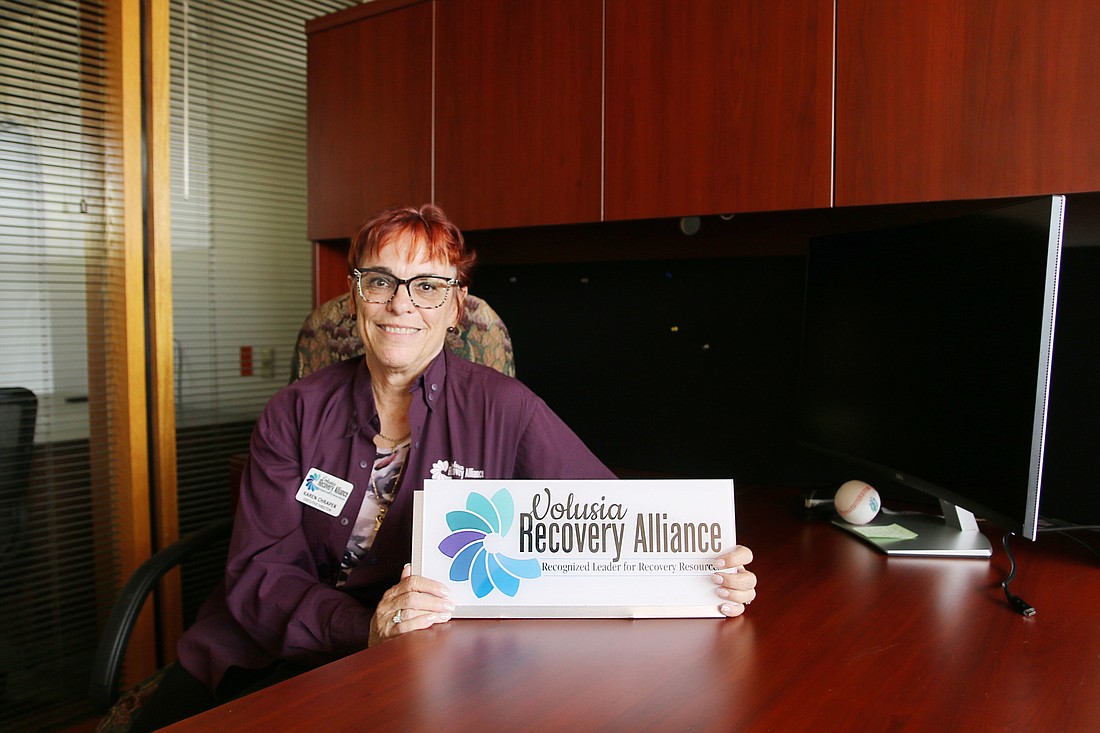- April 18, 2024
-
-
Loading

Loading

The Volusia Recovery Alliance aims to make the county a "recovery-ready community."
What does that mean?
It means people affected with substance use disorder can get housing and resources to get help, and they can do so without battling stigma surrounding the disorder, said Karen Chrapek, Volusia Recovery Alliance executive director.
"That stigma has been reduced to a degree that it's not really an issue anymore in our community," Chrapek said. "... And so if we could eliminate 'not in my neighborhood,' and really be accepted, that people know in Volusia — recovery is possible."
The VRA, a nonprofit based in Ormond Beach, was developed through a grant from the Aetna Foundation via the Florida Alcohol and Drug Abuse Association to create recovery community organizations in Florida. Ginny LaRue, director of the All in for Florida: A Recovery Project, lives in Volusia, and so naturally, wanted to kickstart the initiative here.
She approached Chrapek and asked her if she wanted to become part of launching a recovery community organization, and Chrapek agreed.
That was in 2018. Four years later, the VRA is hard at work operating as a recovery hub to provide resources for those seeking the first steps recovery. The nonprofit recently moved into its "Hope Hub" at 454 S. Yonge St., Unit A in Ormond Beach.
Chrapek loves the name.
"My favorite saying is: 'Where there's breath, there's hope,'" she said.
In 2019, the VRA hosted a community symposium where the nonprofit was able to ask the community about its biggest recovery needs. They found them to be the need for more treatment, peer support service and community education about substance use disorder.
From that, the VRA created its founding board, held "visioning" meetings to discuss the symposium's findings, and eventually became a 501c3 in the spring of 2020.
Chrapek described the VRA's efforts as grassroots and community-driven. The organization's signature fundraiser is its annual Keeping Hope: Overdose Awareness and Remembrance Day, which was held for the fourth year in a row on Aug. 31.
VRA offers mutual aid groups such as the "Invitation to Change" family group for families to be able to communicate with loved ones with substance use disorder; and "Recovery Connections for Moms," a group for mothers who have substance-exposed newborns or children, or who have substance use disorder themselves. The organization also offers an art therapy workshop called "A Window Between Worlds" for people with substance use disorder and trauma.
In addition, the VRA focuses on providing training on substance use disorder and overdose response for the community. Since its inception, it has dispensed 4,030 Narcan kits and trained 1,570 people in overdose response and reversal training. A total of 97 overdose reversals using the VRA's Narcan kits have been reported by the community.
"We're like bamboo," Chrapek said. "We're now shooting up, like at first it's kind of dormant, and then it creeps and then it leaps, and that's kind of like what's happened to VRA."
From January 1 to Sept. 21, Chrapek said 236 people in Volusia County had died from an overdose, per the data she receives from the Volusia Sheriff's Office. It's part of the reason VRA focuses on distributing Narcan to the community, and hopes to extend its efforts soon to schools.
Unlike other drug overdoses, fentanyl — a synthetic opioid responsible for the majority of drug overdose deaths in Volusia County — people can use it one time and overdose, Chrapek said.
Chrapek is no stranger to recovery.
For her, Dec. 1 will mark 40 years on continuous recovery from substance use and bulimia. She was able to get help because a friend reached out a hand to her, she said.
Chrapek was a candidate for recovery at age 20, but she was "high-functioning" and worried about being judged if she asked for help. She was afraid she would lose her job. So she used drugs for nine more years. But in 1982, thanks to that friend, who was a licensed social worker, she was able to find help.
"I've spent almost 40 years in a pathway of my own recovery," Chrapek said. "I've been blessed to help many, many women, and this is just a culmination of all my experience in recovery, my passion in recovery, and when I'm gone, I believe Volusia Recovery Alliance will carry on."
Recovery is not only possible, but it should be expected, she added.
"We're here to help people get into recovery and stay in recovery," Chrapek said.